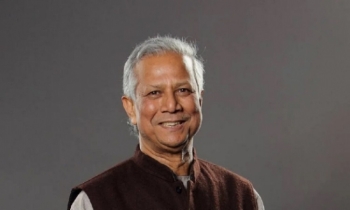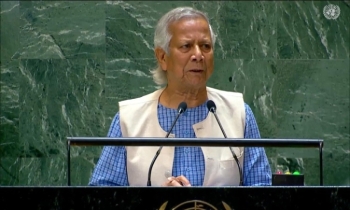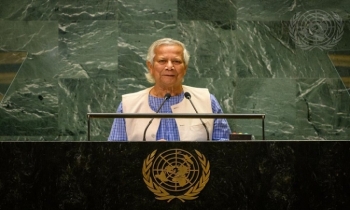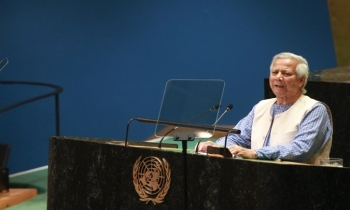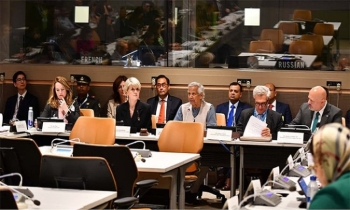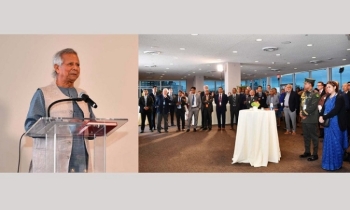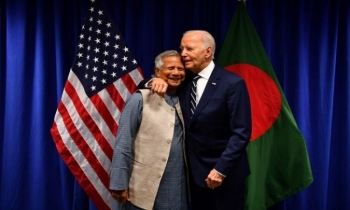Bangladesh, Japan to develop strategic ties
UNB || BusinessInsider
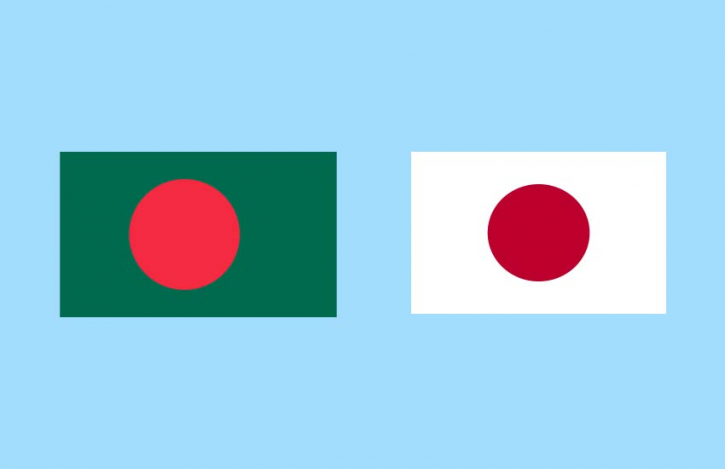
Bangladesh Japan Flag. Photo: Collected
Bangladesh and Japan on Thursday discussed ways to develop strategic ties giving a big boost to the existing comprehensive partnership as the two countries want to open a new chapter in their relations in 2022.
“We’re now trying, and we discussed it today (Thursday) how we can elevate the comprehensive relationship to strategic relations,” Foreign Secretary Masud Bin Momen told reporters at the Ministry of Foreign Affairs after a virtual marathon meeting with his Japanese counterpart Hiroshi Suzuki.
During the meeting that continued for over two hours, he said they discussed what will be the elements and building blocks of the strategic relations, and the Japanese side showed much interest to that end.
Bangladesh is set to celebrate the 50th anniversary of its independence this year and the 50th anniversary of Japan-Bangladesh diplomatic relations in 2022.
The foreign secretary said they are unable to plan properly due to the Covid-19 situation but the two countries will take many programmes in hand including visits of two Prime Ministers in 2022.
He further said Father of the Nation Bangabandhu Sheikh Mujibur Rahman paid an official visit to Japan from 18 to 24 October 1973 at the invitation of the Japanese government that cemented relations between the two countries.
Prime Minister Sheikh Hasina paid an official visit to Japan in 2014 and there was a subsequent visit by then Japanese Prime Minister Shinzo Abe.
During the visits, the Foreign Secretary said, the two leaders termed the relations a “comprehensive” one with broader economic and investment ties.
The two sides discussed the regional issues and the Initiative of BIG-B (The Bay of Bengal Industrial Growth Belt), Masud Momen said.
He said the Japanese side discussed the issue of ‘Free and Open Indo-Pacific’ and development in the whole region.
Japan says it will have stronger cooperation with Bangladesh, especially for enhancing regional stability and connectivity in the region, as the development of Bangladesh contributes to the stability of the Indo Pacific region.
“Bangladesh is achieving a higher rate of economic growth. We’ll further promote comprehensive partnership with Bangladesh,” Senior Regional Coordinator at Southwest Asia Division of the Japanese Ministry of Foreign Affairs Hitomi Sato told UNB.
Bangladesh and Japan are currently focusing more on infrastructure development and business partnership under the “BIG-B” initiative.
The two countries have deepened friendship and partnership in several areas including Matarbari deep sea-port, Dhaka Metro and Terminal 3 of the international airport in Dhaka.
The Foreign Secretary said Bangladesh also sought Japan's support in Rohingya repatriation and their return to Myanmar is Bangladesh’s priority.
“Our priority is repatriation. They respect it. They’ve understood our position,” said Masud Momen mentioning that the Bangladesh side briefed the Japanese side about the latest position under military takeover in Myanmar.
Bangladesh also sought support from Japan if any outcome is found through the tripartite mechanism with China and Myanmar.
The Foreign Secretary said Bangladesh wants to see a special role from countries, including India and Japan, for ensuring safety, security and sustainable living of Rohingyas in Myanmar part once they cross the Bangladesh border through repatriation.
Bangladesh and Myanmar signed the repatriation deal on November 23, 2017. On January 16, 2018, Bangladesh and Myanmar signed a document on ‘Physical Arrangement’, which was supposed to facilitate the return of Rohingyas to their homeland.
Bangladesh says the Rohingyas do not trust their government, and Bangladesh gave several proposals to build trust among them.
Bangladesh is trying in multiple ways -- bilaterally, multilaterally, tri-laterally and through the judicial system -- to find a lasting solution to the Rohingya crisis.
Bangladesh proposed deployment of nonmilitary civilian observers from Myanmar’s friendly countries -- Japan, China, Russia, India and Asean countries.


